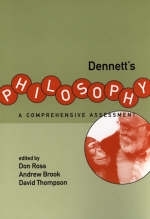
Dennett's Philosophy
A Comprehensive Assessment
Seiten
2000
Bradford Books (Verlag)
978-0-262-18200-3 (ISBN)
Bradford Books (Verlag)
978-0-262-18200-3 (ISBN)
- Keine Verlagsinformationen verfügbar
- Artikel merken
These essays, which grew out of a conference attended by Dennett, consider evolution, intentionality, consciousness, ontology, and ethics and free will.
The influential philosopher Daniel Dennett is best known for his distinctive theory of mental content, his elucidation of how the complex components of mental processing seem to come together in the relatively coherent narratives that we tell ourselves about ourselves and in his vivid accounts of how to think about minds in their evolutionary setting. The essays in this collection step back to ask: Do the complex components of Dennett's work on intentionality, consciousness, evolution, and ethics themselves come together into a coherent philosophical system?
The essays, which grew out of a conference attended by Dennett, consider evolution, intentionality, consciousness, ontology, and ethics and free will. Unusually, for a collection of this kind, the authors were able to take account of Dennett's comments on their views. In the concluding essay, "With a Little Help from My Friends," Dennett offers his own thoughts on the comprehensiveness of his philosophy.
Contributors
Andrew Brook, Timothy Crowe, Daniel C. Dennett, Paul Dumouchel, Timothy Kenyon, Dan Lloyd, Ruth Garrett Millikan, T. Brian Mooney, Thomas Polger, David Rosenthal, Don Ross, William Seager, David Thompson, Christopher Viger
The influential philosopher Daniel Dennett is best known for his distinctive theory of mental content, his elucidation of how the complex components of mental processing seem to come together in the relatively coherent narratives that we tell ourselves about ourselves and in his vivid accounts of how to think about minds in their evolutionary setting. The essays in this collection step back to ask: Do the complex components of Dennett's work on intentionality, consciousness, evolution, and ethics themselves come together into a coherent philosophical system?
The essays, which grew out of a conference attended by Dennett, consider evolution, intentionality, consciousness, ontology, and ethics and free will. Unusually, for a collection of this kind, the authors were able to take account of Dennett's comments on their views. In the concluding essay, "With a Little Help from My Friends," Dennett offers his own thoughts on the comprehensiveness of his philosophy.
Contributors
Andrew Brook, Timothy Crowe, Daniel C. Dennett, Paul Dumouchel, Timothy Kenyon, Dan Lloyd, Ruth Garrett Millikan, T. Brian Mooney, Thomas Polger, David Rosenthal, Don Ross, William Seager, David Thompson, Christopher Viger
Don Ross is Professor of Economics and Dean of Commerce at the University of Cape Town, and Research Fellow in the Center for Economic Analysis of Risk at Georgia State University. He is the author of Economic Theory and Cognitive Science: Microexplanation (MIT Press, 2005), companion volume to Midbrain Mutiny. Andrew Brook is Professor of Philosophy, Director of Interdisciplinary Studies, and Chair of the Cognitive Science Program at Carleton University, Ottawa.
| Reihe/Serie | A Bradford Book |
|---|---|
| Verlagsort | Massachusetts |
| Sprache | englisch |
| Maße | 152 x 229 mm |
| Gewicht | 680 g |
| Themenwelt | Geisteswissenschaften ► Philosophie ► Philosophie der Neuzeit |
| ISBN-10 | 0-262-18200-9 / 0262182009 |
| ISBN-13 | 978-0-262-18200-3 / 9780262182003 |
| Zustand | Neuware |
| Informationen gemäß Produktsicherheitsverordnung (GPSR) | |
| Haben Sie eine Frage zum Produkt? |
Mehr entdecken
aus dem Bereich
aus dem Bereich


